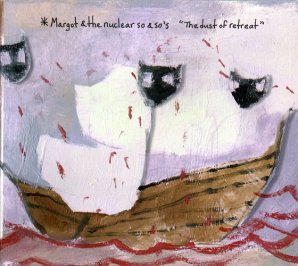from Rock Music Review (www.rockmusicreview.com)
Margot and the Nuclear So and So’s (website / MySpace)
The Dust of Retreat (2005)
Reviewed by Andrew Malott (link)
Margot and the Nuclear So and So’s deftly combine sounds of folky acoustic guitar, driving electric guitar, smooth cello, and catchy piano to create a wonderfully unique sound. Singer/songwriter Richard Edwards, formerly of the band
The first two tracks “A Sea Chanty of Sorts” and “On a Freezing Chicago Street” pass by without a big, catchy chorus, but they are no less important in their own right, nor are they altogether without any hooks to speak of. Both are exemplary of Richard’s uncanny ability to write songs that are catchy and undeniably pop, but unique enough to be called indie. The fourth track “Quiet as a Mouse” stands out in that it is the only song on the album to feature a truly rocking chorus. Distorted power chords and soaring vocal melodies are a nod back to Richard’s days with
Songs like “Jen Is Bringin’ the Drugs” and “A Light on a Hill” are wonderful showcases for Richard’s singer/songwriter roots. With lyrics like “Love is an inkless pen / It’s a tavern, it’s sin / It’s a horrible way to begin,” he’s no stranger to the loved-and-lost formula, but he avoids it and only hints at subjects other singers might have come right out and said. Richard’s use of metaphor is both highly romanticized and mysterious; he leaves out the details for the listener to fill in. On “Vampires in Blue Dresses,” “Barfight Revolution / Power Violence,” and “Skeleton Key,” the band really gets a chance to have some fun; they serve as a great contrast to the quieter, pensive mood of some of the other tracks like “Dress Me Like a Clown” and “Talking in Code.” With jingling bells and a sweet, descending piano melody, the final song “Bookworm” brings the album to a satisfying close.
Technically, the album represents a watermark for producer Tyler Watkins, who is also the bassist of the band. Every track is easy to listen to with an even frequency spectrum and balanced highs and lows. The loud parts are loud and rocking, while the softer parts have just the right amount of compression to bring out the intricacies of the performance while still retaining enough dynamic sway.
The talented musicians of Margot and the Nuclear So and So’s have a bright future ahead of them with a great debut album to boot. It will be a shame if future listeners, lured in by the band’s ever increasing popularity, never have the pleasure of hearing this album. It will be an even bigger shame if the band’s sound is waxed over by the suits of the recording industry in hopes of making even more money. Hopefully Richard and the band have enough wits about them to keep their musical integrity in highest priority as they start to show up on the big scene.
9.0 / 10.0
